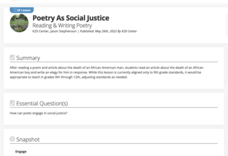Anti-Defamation League
Social Justice Poetry
Learners gain insight into how songs and poems express feelings of injustice. They also learn about literary devices and types of poems and make a personal connection when they write their own free verse poems about injustice.
K20 LEARN
Poetry as Social Justice: Reading and Writing Poetry
Words can be a powerful tool in the hands of a poet. Class members examine a poem written by Ross Gay in response to the death of Eric Garner and a news report of the same death. They then read an article about the death of Tamir Rice...
Facing History and Ourselves
Speaking Up and Speaking Out
The final lesson plan in the Standing Up for Democracy unit offers class members a way they can stand up and speak out by crafting spoken word poetry, or Slam poetry. After analyzing several examples, individuals reflect on one positive...
PBS
Exploring Identity and Intersectionality in Poetry
Just as Kermit the Frog notes, "It isn't easy being green!" it isn't easy occupying "multiple Identity spaces." Class members read and discuss poems by writers detailing what it is like when their identities are "oppressed."
Curated OER
Lesson: Emory Douglas: Revolution in Our Time, Part 2
I love lessons like this because they let kids see the power of art, poetry, and activism in times of social injustice and unrest. They'll analyze the art used by Emory Douglas in the production of the Black Panther newspaper and...
Curated OER
A Voice for Hard Issues
Ouch! The final lesson in the 12-resource poetry unit models for young writers how poems can be used to voice hard truths.
Crafting Freedom
George Moses Horton: Slavery from a Poet's Perspective
After reading about the life of George Moses Horton, the first slave to publish anti-slavery poetry, learners will recall his major accomplishments, provide a summary of the obstacles he faced, and identify common aspects of the...
Facing History and Ourselves
Responding to Difference
James Berry's poem, "What Do We Do With a Difference?" launches a lesson that asks class members to consider the ways people respond when they encounter someone different from themselves. After analyzing the poem and discussing how they...
Just Health Action
Causes of the Causes: What Are the Root Causes of This Problem?
A "Causes of the Causes" diagram enables class members to examine the contributing factors to a problem. After reading a poem that models the process, class members, either in gorps or individually, diagram an issues they are passionate...
Anti-Defamation League
"What is it Like to be an Outsider?”: Building Empathy for the Experiences of Immigrants
This instructional activity highlights the struggles of immigrants and the importance of showing empathy. Beginning with a read-aloud of a book in another language and a poem, scholars take part in a thoughtful discussion. Then, the...
Curated OER
Langston Hughes: Artist and Historian
Students examine the life and works of Langston Hughes. In groups, they research the characteristics of the Harlem Renaissance and how Hughes' poems relate to the era. They use the themes in his writings and relate it to the Great...
Curated OER
Poets Got Them Blues
Contemplate what music learners listen to and why they listen. Can they find poetry within music lyrics? Specifically hone in on blues lyrics and ruminate upon the social issues prevalent in the themes. Particular song lyrics coincide...
Curated OER
Who Were the Dissidents?
Students discover how Japanese dissidents spoke out against the injustice practiced in Imperial Japan. In this Japanese history lesson, students listen to a lecture about the silent dissidents in the nation prior to World War II and the...
Curated OER
I Was Hungry
Students engage in a lesson that focuses on the problem of hunger in the world. They are presented with the concept of being a global citizen. The context of the lesson is the reading of poetry and focusing on the statement "I was...
Curated OER
Langston Hughes
Students identify similarities between Hughes' poetry and music (jazz and the blues).
Curated OER
UNDERSTANDING KARMA, DHARMA, AND SAMSARA
Students examine the Indian concepts of dharma, karma and samsara, see how violating one's dharma might lead to becoming an out-caste, and appreciate how these concepts undergird Indian life.
Curated OER
What is Child Labor?
Pupils examine the topic of child labor in history. They discuss jobs that children their age would have done before child labor laws. They decide on an action to take on Labor Day to share what they have learned with others.
Curated OER
Understanding Karma, Dharma and Samsara
Learners understand the Indian concepts of dharma, karma and samsara, see how violating one's dharma might lead to becoming an out-caste, and appreciate how these concepts undergird Indian life
British Library
British Library: Barrett Browning's Poetry: Social & Political Commentary
Elizabeth Barrett Browning gave a voice, in her poems, to many of those oppressed by contemporary injustice: child laborers, the poor, and the enslaved. In this lesson, students will give these voices dramatic form, using the techniques...




















